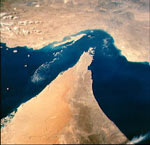 Bloomberg: Thailand should be used as a base to store crude-oil supplies from Middle East producers spooked by Iran’s threat to shut the Strait of Hormuz, according to the head of the country’s biggest energy company. Bloomberg
Bloomberg: Thailand should be used as a base to store crude-oil supplies from Middle East producers spooked by Iran’s threat to shut the Strait of Hormuz, according to the head of the country’s biggest energy company. Bloomberg
By Daniel Ten Kate and Supunnabul Suwannakij
 Thailand should be used as a base to store crude-oil supplies from Middle East producers spooked by Iran’s threat to shut the Strait of Hormuz, according to the head of the country’s biggest energy company.
Thailand should be used as a base to store crude-oil supplies from Middle East producers spooked by Iran’s threat to shut the Strait of Hormuz, according to the head of the country’s biggest energy company.
“Look at the vulnerability of the Hormuz Strait,” Pailin Chuchottaworn, chief executive officer of state-controlled PTT Pcl (PTT), said in an interview in Bangkok yesterday. “All the oil exporters, Kuwait, United Arab Emirates, Saudi Arabia, Iraq, they all want to send out the oil and keep it outside of the Gulf.”
Pailin urged Thai policy makers to approve a 90-day oil reserve using either state funds or foreign reserves, a move the central bank has resisted. Storage facilities would be located in southern Thailand along with an oil pipeline linking the Indian Ocean with the South China Sea that would allow crude to bypass Singapore and the Strait of Malacca, he said.
U.S., European Union and Israeli efforts to halt Iran’s nuclear program threaten to disrupt supplies in a region that holds 54 percent of global oil reserves, pushing crude prices higher this year. Iran has threatened to close the Strait of Hormuz, a transit route for a fifth of the world’s crude, in response to an embargo.
Iran would view moves by Saudi Arabia or other Middle Eastern exporters to establish permanent storage facilities in Asia as provocative, according to Tony Regan, a consultant with Singapore-based Tri-Zen International Ltd. Moreover, demand for oil will decline relative to natural gas over the next decade, reducing the need for overseas oil depots, he said.
Strategic Reserve ‘Justification’
“This is another way of bringing attention back to the idea of a land bridge in Thailand, which I just don’t see as having much traction,” said Regan, who was previously an executive with Royal Dutch Shell Plc (RDSA) in the liquefied-natural- gas business. “Perhaps he’s also using this as a justification for Thailand having a strategic reserve, which would be great for PTT because they can benefit from it.”
The decades-old land bridge proposal, which includes oil pipelines, storage facilities and supporting industries, is “viable,” Pailin said. He blamed opposition from countries near the Malacca Strait and the central bank’s reluctance to fund a strategic oil reserve for stalling its implementation.
Thailand should aim for a strategic reserve of between 60 million and 90 million barrels, Pailin said, adding that it would cost as much as $10 billion and take as long as a decade to build up.
Bank of Thailand Governor Prasarn Trairatvorakul last year said the central bank “needs cautious studies” before it uses foreign reserves to establish an oil stockpile. Thailand’s reserves amounted to $178 billion at the end of January, the second-most in Southeast Asia after Singapore.
Shares Gain
PTT and its major affiliates account for more than a fifth of the value of Thailand’s benchmark SET index. Shares of the company, 51-percent owned by the finance ministry, have gained 14 percent this year, compared with an 11 percent increase in the Bloomberg World Energy index.
PTT missed analyst estimates in reporting fourth-quarter net income of 16.6 billion baht ($544 million), down 26 percent from a year earlier, on a weakening global economy and flooding in Thailand. Of 33 analysts tracked by Bloomberg, 29 have buy ratings, with the rest recommending investors to hold the stock.
PTT is seeking to acquire new oil and gas reserves and secure LNG imports as it aims to supply half of Thailand’s daily energy demand by 2020, up from 15 percent now, Pailin said. PTT Exploration & Production Pcl, which accounted for 31 percent of PTT’s net income last year, offered 1.1 billion pounds ($1.75 billion) for Cove Energy Plc last week, trumping an earlier bid for the African explorer by Shell.
Cambodia, Myanmar
“This is not our first attempt in Africa, but it’s definitely a good example that we reach as far as south and middle Africa for energy,” Pailin said. “Oil is getting scarce and we have to go further and deeper to get the energy.”
As executives scan the globe looking for reserves, some areas for expansion sit close to home in neighbors Myanmar and Cambodia. PTT plans to invest 720 billion baht over the next five years, with half reserved for PTT Exploration to develop oil and gas fields at home and overseas, according to a Feb. 17 statement.
Thai government talks with Cambodia on jointly developing an overlapping claims area have seen “lots of progress,” Pailin said. Former Thai Energy Minister Pichai Naripthaphan said Oct. 12 that gas reserves in the disputed zone may at least be equal to the country’s current reserves, which BP Plc estimates at 11 trillion cubic feet, equivalent to about a tenth of China’s gas reserves.
Myanmar, which is undergoing political reforms after decades of military rule, is an “ideal place” for Thai companies to invest to supply goods for its 62 million people, Pailin said. The country supplies Thailand with a quarter of its total daily gas needs, a percentage that will probably stay the same over the next decade, he said.
“From now on Myanmar wants to reserve new discoveries for their own use,” Pailin said. “We are ready to support the government in terms of their plans to develop the economy using that oil and gas.”


